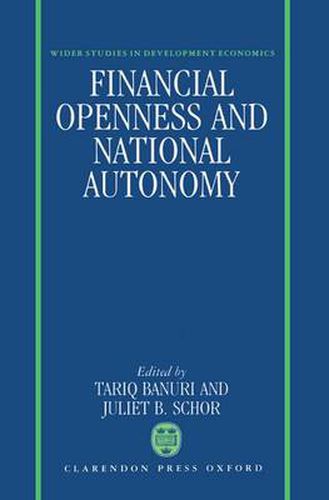Readings Newsletter
Become a Readings Member to make your shopping experience even easier.
Sign in or sign up for free!
You’re not far away from qualifying for FREE standard shipping within Australia
You’ve qualified for FREE standard shipping within Australia
The cart is loading…






WIDER The World Institute for Development Economics Research, established in 1984, started work in Helsinki in 1985, with the financial support of the Government of Finland. Its principal purpose is to help identify and meet the need for policy-oriented socio-economic research on pressing global and developmental problems and their inter-relationships. WIDER’s research projects are grouped into three main themes: hunger and poverty; money, finance, and trade; and development and technological transformation. The 1980s ushered in a ‘globalization’ of finance, and governments began rejecting the task of engaging in international financial management. A new doctrine - global neoclassicism - arose, based on the idea that government regulation of financial markets was futile and foolish. The authors of this book tackle the question of whether national policy autonomy is still possible, in the process challenging the new orthodoxy, and the dangers attendant upon deregulation. They explore the ‘political economy’ of financial openness, and the political nature of recent developments such as the ascendency of private financial interests and a reduced role for government regulation. The book includes both general historical and theoretical approaches, as well as case studies of various countries, such as Australia, Mexico, and Pakistan. It represents a major contribution in the political economy of international finance.
$9.00 standard shipping within Australia
FREE standard shipping within Australia for orders over $100.00
Express & International shipping calculated at checkout
WIDER The World Institute for Development Economics Research, established in 1984, started work in Helsinki in 1985, with the financial support of the Government of Finland. Its principal purpose is to help identify and meet the need for policy-oriented socio-economic research on pressing global and developmental problems and their inter-relationships. WIDER’s research projects are grouped into three main themes: hunger and poverty; money, finance, and trade; and development and technological transformation. The 1980s ushered in a ‘globalization’ of finance, and governments began rejecting the task of engaging in international financial management. A new doctrine - global neoclassicism - arose, based on the idea that government regulation of financial markets was futile and foolish. The authors of this book tackle the question of whether national policy autonomy is still possible, in the process challenging the new orthodoxy, and the dangers attendant upon deregulation. They explore the ‘political economy’ of financial openness, and the political nature of recent developments such as the ascendency of private financial interests and a reduced role for government regulation. The book includes both general historical and theoretical approaches, as well as case studies of various countries, such as Australia, Mexico, and Pakistan. It represents a major contribution in the political economy of international finance.